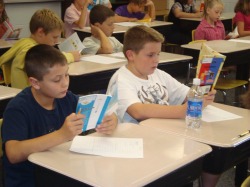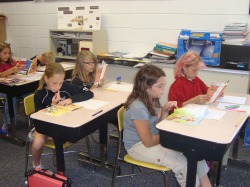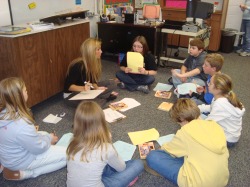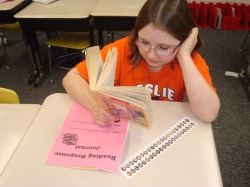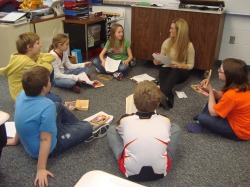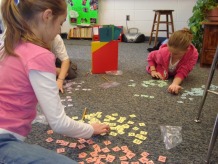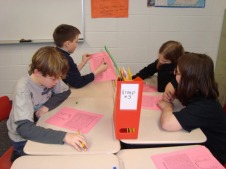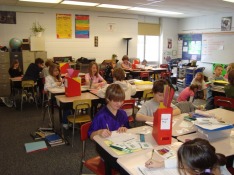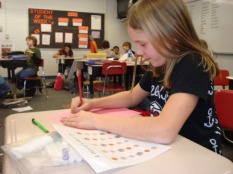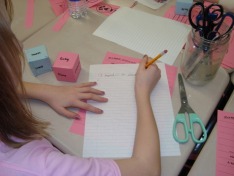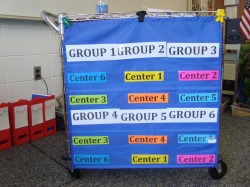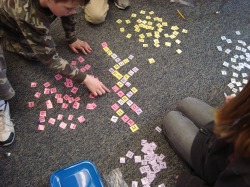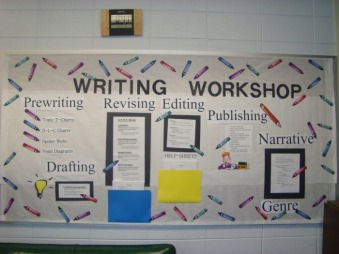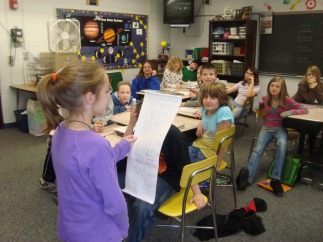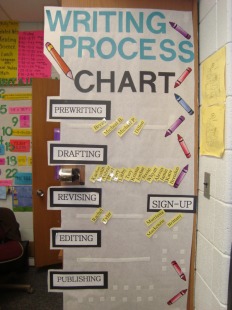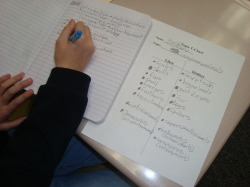Reading Groups & Response Journals
Gone are the days when a teacher would just spend the language arts class period teaching one book. Now, the system has a district-wide "reading workshop" strategy that also includes the study of words, writing, as well as reading. And within the study of reading, students read by themselves, in small groups using different books on a range of difficulty levels as well as analyzing literature as a group. (Oleniacz, Teachers using new strategies to teach reading, 2009)
OBJECTIVES
1. Students will apply reading strategies to increase comprehension of text including: predicting, constructing mental images and visual representations, questioning, re-reading, inferring, summarizing and engaging in interpretive discussions.
2. Students will analyze how characters’ traits and setting define plot, climax, the role of dialogue, and conflicts with resolutions.
RATIONALE
Students often simply read a short novel or informational text and don’t take the time to organize their thinking or check their understanding. The journals encourage students to:
1. Apply their understanding to comprehensive questions
2. Use context clues to identify unfamiliar vocabulary
3. Make inferences and predictions using evidence from the story
4. Summarize parts of the story
5. Make text-to-self and text-to-text connections
6. Illustrate characters and scenes in the story
7. Ask questions of the text and author
1. Students will apply reading strategies to increase comprehension of text including: predicting, constructing mental images and visual representations, questioning, re-reading, inferring, summarizing and engaging in interpretive discussions.
2. Students will analyze how characters’ traits and setting define plot, climax, the role of dialogue, and conflicts with resolutions.
RATIONALE
Students often simply read a short novel or informational text and don’t take the time to organize their thinking or check their understanding. The journals encourage students to:
1. Apply their understanding to comprehensive questions
2. Use context clues to identify unfamiliar vocabulary
3. Make inferences and predictions using evidence from the story
4. Summarize parts of the story
5. Make text-to-self and text-to-text connections
6. Illustrate characters and scenes in the story
7. Ask questions of the text and author
In the “reading workshop” setting, I was able to implement independent practice and the small group discussions. Students were able to practice reading strategies independently, share their responses and opinions to the text freely, and interpret and analyze each others responses. All of these tasks created a successful literacy learning environment for my students.
Literacy Centers
What are Literacy Centers?
A literacy center features hands-on activities that reinforce concepts and themes taught in the classroom. Children can practice what they learn in class in an engaging, interactive environment. A literacy center provides students with opportunities to work independently and with others. In order for the literacy centers to be effective, they must be interesting and deal with topics that you have already taught to the class.
Literacy centers involve a great deal of advanced planning in order for them to be effective classroom tools. A teacher must decide how many centers will be located in the classroom. In my classroom, I found that 4 centers going on at a time with 4-6 students at each center allowed provided enough variety but still gave me the ability to manage the centers. Each center must have materials arranged in an organized manner so that students can find what they need and clean up when the activity is ready to be put away.
A literacy center features hands-on activities that reinforce concepts and themes taught in the classroom. Children can practice what they learn in class in an engaging, interactive environment. A literacy center provides students with opportunities to work independently and with others. In order for the literacy centers to be effective, they must be interesting and deal with topics that you have already taught to the class.
Literacy centers involve a great deal of advanced planning in order for them to be effective classroom tools. A teacher must decide how many centers will be located in the classroom. In my classroom, I found that 4 centers going on at a time with 4-6 students at each center allowed provided enough variety but still gave me the ability to manage the centers. Each center must have materials arranged in an organized manner so that students can find what they need and clean up when the activity is ready to be put away.
Spelling Centers:
Alphabet Tiles
Word Search
Alphabetical Order
Word Ladder
Word Worth
Math Twist Spelling
English Centers:
WEEK 1:
Is That a Fact?
Subject/Predicate Dice
Verb Sentence Strips
WEEK 2:
Scoop and Sort
Contractions
Adjectives
WEEK 3:
Synonyms/Antonyms
Inference Cards
Vocabulary Building
WEEK 4:
Word Sort
Easy as Pie
Paragraph Order
WEEK 5:
Scoop and Sort
Adverbs
Vocabulary Building
WEEK 6:
Context Clue Cards
Write a How-To article
Roots/Prefixes/Suffixes
WEEK 7:
Compound Words
Pronouns with Newspaper Articles
Word Sort
WEEK 8:
Inference Cards
Vocabulary Building
Scoop and Sort
WEEK 9:
Homophones/Homographs
Prepositions
Idioms
WEEK 10:
Current Events
Conjunctions
Read, Think, Sort
Writing Centers:
Procedure writing: Directions
Procedure writing: Ads
Procedure writing: Lists
Alphabet Tiles
Word Search
Alphabetical Order
Word Ladder
Word Worth
Math Twist Spelling
English Centers:
WEEK 1:
Is That a Fact?
Subject/Predicate Dice
Verb Sentence Strips
WEEK 2:
Scoop and Sort
Contractions
Adjectives
WEEK 3:
Synonyms/Antonyms
Inference Cards
Vocabulary Building
WEEK 4:
Word Sort
Easy as Pie
Paragraph Order
WEEK 5:
Scoop and Sort
Adverbs
Vocabulary Building
WEEK 6:
Context Clue Cards
Write a How-To article
Roots/Prefixes/Suffixes
WEEK 7:
Compound Words
Pronouns with Newspaper Articles
Word Sort
WEEK 8:
Inference Cards
Vocabulary Building
Scoop and Sort
WEEK 9:
Homophones/Homographs
Prepositions
Idioms
WEEK 10:
Current Events
Conjunctions
Read, Think, Sort
Writing Centers:
Procedure writing: Directions
Procedure writing: Ads
Procedure writing: Lists
Writing Workshop
What is a Writing Workshop?
Writer's Workshop is a teaching technique that invites students to write by making the process a meaningful part of the classroom curriculum. Ideally students are introduced to the process of writing in the early elementary grades and write daily through varied activities. In Writer's Workshop, Upper Elementary students organize thoughts to create a story or write about a given topic and develop it into an understandable narrative with a voice and focus that present information to the reader. Upper Elementary students are able to use writing mechanics comfortably and the shift in their cognitive abilities to higher order thinking allows them to develop a more sophisticated sense of what makes good writing.
Writer's Workshop is a teaching technique that invites students to write by making the process a meaningful part of the classroom curriculum. Ideally students are introduced to the process of writing in the early elementary grades and write daily through varied activities. In Writer's Workshop, Upper Elementary students organize thoughts to create a story or write about a given topic and develop it into an understandable narrative with a voice and focus that present information to the reader. Upper Elementary students are able to use writing mechanics comfortably and the shift in their cognitive abilities to higher order thinking allows them to develop a more sophisticated sense of what makes good writing.
